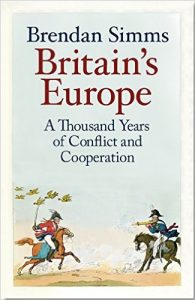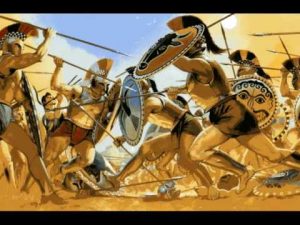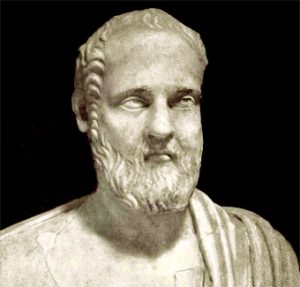I debated posting this for a while. I hate standing on a soap box, and this is a blog about books, not politics. But there’s so much going on worldwide at the moment that I’ve started feeling like an ostrich, hiding my head in the sand. What gave me the final push was TJ’s post, Sorrow in the US.
You can rest assured that I’m not changing the direction of this blog and that normal posts will continue right after this one, with a fascinating look at parchments and their use in Medieval times.
Arcadia? Not really
Despite modern visions of Arcadia, ancient Greece wasn’t an easy place to live in. The various city-states were in constant war with each other. The only time they came together was when facing an external threat, such as the Persian invasions. And Pax Romana was the longest period that ancient Greece enjoyed in its turbulent history.
Language, Blood, Religion
Long before Rome’s ascent, several philosophers questioned the city-states’ never-ending fight for supremacy and the resulting carnage. In search of a Greek identity, Herodotus ended up with four criteria: “Τὸ Ἑλληνικόν, ἐὸν ὅμαιμόν τε καὶ ὁμόγλωσσον, καὶ θεῶν ἱδρύματά τε κοινὰ καὶ θυσίαι, ἤθεά τε ὁμότροπα” – Greeks are those who share a common blood, language, religion, and customs. Anyone not satisfying these criteria was deemed a barbarian. (On an interesting side note, the very word barbarian came from the way other languages sounded to Greeks, like a constant repetition of the sound barb, barb, barb.)
Europe often reminds me of ancient Greece, with its long history of wars. After centuries of infighting in Europe, we have built the European Union. This has guaranteed peace and prosperity for the last 70 years, and perhaps some day may even form a closer political union – sort of the United States of Europe.
But we’re still a long way from that. I would love to say that the religion criterion is no longer relevant, but then I think of the whole the West vs. Islam mess. And the whole language/blood/religion/customs argument is one that has found an alarming echo in today’s cultural wars. The result of the recent Brexit referendum has been deeply divisive, while the recent racial killings in the US show just how powerful the “Us vs. Them” mentality still is, even between people that have so much in common.
Education
A second school of thought held that the language/blood/religion/customs criteria were misleading from the start. Isocrates argued that anyone who partook of the Greek education is a Greek – “Ἕλληνας καλεῖσθαι τοὺς τῆς παιδεύσεως τῆς ἡμετέρα.”
This enlightened approach essentially argued in favor of spreading Greek soft power through education. Ironically enough, it became the way through which Greek thinking survived Roman occupation centuries later: in Horace’s words, “Graecia capta ferum victorem cepit” (“Captive Greece captured her rude conqueror”).
Fault-lines
Every society has fault-lines that range from deep to superficial. Multiculturalism is often blamed for exacerbating this, and yet, after the Balkan Wars, Greece became one of the most monocultural societies in the world. Thirty years later, civil war broke out between supporters of the king and the Communists. And there’s no doubt that ancient Greece was as monocultural a place as you can find in the world. And yet, barely a year passed without a war breaking out.
Rich vs. Poor. Black vs. White. Protestant vs. Catholic. Christian vs. Muslim. Gay vs. Straight. Muslim vs. Jew. Left vs. Right. Liberal vs. Conservative. Pro-Europe vs. Eurosceptics. Natives vs. Immigrants. Catholic vs. Orthodox. Pro-life vs. Pro-choice. The NRA vs., well, everyone else (a study showed 90% of Americans in favor of universal background checks).
All these are fault-lines that run through our societies. They have one thing in common: they have been exploited by ruthless people who look to control people through fear. Politics and politicians are a prime example, but fear-mongering is not limited there.
A recent example: Greece is predominantly Greek Orthodox, with a tiny Catholic minority, mostly in the Aegean islands. A few weeks ago, an ultra-religious pamphlet-waving fellow warned me about Catholics invading my home to proselytize me. Apparently, this was a reaction to an upcoming Orthodox Synod that aimed to update some obscure, outdated regulations. In a bizarre twist, he then blamed Jews for that, along with traitors, Masons, and heretics from within the church.
When someone mentions the words “Jews,” “Masons,” and “traitors” in a single breath, I know it’s time for me to get the hell out of there.
Britain’s Europe
The need for an identity is very real. But we should not define ourselves through our fear of the Other. As this is a blog about books, I will mention here a recent publication by Brendan Simms, called Britain’s Europe (you can read the Economist’s review of the book here).
 Brendan Simms is a historian at Cambridge University, who argues that the British notion of an island story is wrong. Britain’s history is above all about continental Europe. From the Romans and Normans to 100 years’ war to the 19th and 20th centuries, Europe mattered above all. Through repeated wars, the British found that the state of continental Europe’s was a vital national interest. Security was to be found on the Rhine or even the Elbe—and the continent should never be allowed to fall under the control of a single country.
Brendan Simms is a historian at Cambridge University, who argues that the British notion of an island story is wrong. Britain’s history is above all about continental Europe. From the Romans and Normans to 100 years’ war to the 19th and 20th centuries, Europe mattered above all. Through repeated wars, the British found that the state of continental Europe’s was a vital national interest. Security was to be found on the Rhine or even the Elbe—and the continent should never be allowed to fall under the control of a single country.
Even The British empire, the world’s biggest, was largely a product of European rivalries. In 1759, a glorious year of British victories from Canada to India, Britain still had more troops in Europe than anywhere else. And British concerns to stop any particular country dominating the continent were at the root of the Napoleonic wars and, a century later, both world wars.
So, the fact that the Brexit camp so easily convinced the British public to effectively is nothing short of astounding. The fact that they achieved this by terrorizing people about immigration and EU regulation speaks volumes about the power of fear. Ironically enough, the experts’ warnings of the consequences a Brexit would have in the economy were dismissed as Project Fear. Within 24 hours, the pound fell from 1.50 to 1.32 against the US dollar, a multi-decade low, and Britain slipped from being the fifth richest country in the world, to place six, with negative prospects (according to rival rating agencies Fitch and Moodie’s, who both downgraded the UK’s credit rating to AA negative). 25% of British companies have stopped hiring, and a number of multi-nationals announced they are considering fleeing the UK. Both Frankfurt and Paris, which have long fought London for the position of Europe’s financial center, are rubbing their hands with glee. And a few days ago, Britain announced tax incentives for companies to remain in London, acknowledging the danger to its interests.
The most important unforeseen consequence of the Brexit referendum, however, was to expose deep fault-lines within Britain. Right after the result was announced, Scotland announced they’re mulling a second referendum. Northern Ireland demands for a unified Ireland followed soon after. Britain has not looked so fragile in centuries. It would, indeed, be ironic if the English quest for greater influence in the world ended up being the nail in the British Empire’s coffin.
That’s the problem with earthquakes – you can’t predict which part of a building will break up first.
A Trump-ed up charge
No post on cultural divisions would be complete without a mention of the dangerous polarization of US politics. In a typical event, Rakeem Jones, 26, and several friends visited a large Trump rally in Fayetteville. They began shouting, “Bigot!” shortly after Trump took the stage. Officers led Jones and his friends toward the exit. As they moved along, a man slipped past security and punched Jones.
The man arrested and charged in the assault on Jones, John McGraw, said in an interview after the incident that “you bet I liked it,” and justified hitting Jones because he might be a foreign terrorist.
We don’t know if he’s ISIS. We don’t know who he is, but we know he’s not acting like an American and cussing me . . . and sticking his face in my head. He deserved it. The next time we see him, we might have to kill him. We don’t know who he is. He might be with a terrorist organization.
Enter Macedonia?
History is very exciting when writing a story based on ancient Greek history, as I have done in Pearseus. Less so when I see the same patterns repeated around me and worry about our future.
Left vs. Right defined Western thinking during the second part of the 20th century. This is now a defunct dichotomy. A new one is taking its place, between those in favor of a cosmopolitan, global, united world with open borders and those who prefer the perceived security of a closed border, monocultural society. The twin evils of nationalism and populism are once again rearing their ugly heads. In Brecht’s words,
I stood on a hill and I saw the Old approaching, but it came as the New. It hobbled up on new crutches which no one had ever seen before and stank of new smells of decay which no one had ever smelt before…
So the Old strode in disguised as the New, but it brought the New with it in its triumphal procession and presented it as the Old. The New went fettered and in rags; they revealed its splendid limbs. And the procession moved through the night, but what they thought was the light of dawn was the light of fires in the sky.
And the cry: Here comes the New, it’s new, salute the New, be new like us! would have been easier to hear if all had not been drowned in a thunder of guns.
The ancient Greek city-states tried repeatedly to overcome their fear and form alliances such as the Delian League. They were all short-lived, condemned by the short-sighted ambitions of the member cities. In the end, Greece was united forcefully by Philip of Macedonia and his son, Alexander the Great. Most Greek cities didn’t really put up a fight. Largely, this was due to the fact that Macedonians were fellow Greeks (they even satisfied that ομόγλωσσον, ομοαίματον, ομόθρησκον criterion), but the sheer exhaustion of centuries of warfare also played a big part.
One thing I’ve learned from history is that peace should never be taken for granted. It would be a shame to risk it, especially when we’ve come such a long way toward a common future.
What to do?
I will close this post with a line from TJ’s post:
I’ve seen a lot of things in my life that I didn’t say anything about. That time has come to an end. There’s a Lawrence Kasdan quote from Silverado, “The world is what you make of it, friend. If it doesn’t fit you make alterations.” That might sound a little cheesy in the vein of this discussion, but I believe that. The world is exactly what we make it. Today I’m trying to make it a better place. I’m hoping others will do the same. We could use some alterations.
If you enjoyed this post, check out John Maberry’s post on killing the will to kill.










A fantastic post, Nicholas. History does repeat itself, but only the characters and the scene differ. I cannot even comment on the idiocy of our “chosen” here. How a nation as large as ours, with so many intelligent and well educated people, can be in the situation we are in with Trump vs Clinton is beyond me.Either way there are no winners in this crazy political climate.Just thinking about it gives me a headache. America and the world need to adopt a all for one and one for all attitude and stop the hatred that exists within cultures.
Hear, hear. Thank you so much 🙂
This was a great post Nicolas, but I don’t think that the union of states into one is necessarily the best way to go. Britain was never all in, they kept they own currency. I think they just got tired of dictates from the EU what to do and meanwhile most people outside of London were out of work and hurting. When countries get too big they become less attentive to the needs of the smaller areas within their realm.
Leslie
True; the union of states is just one possible outcome. Thank you, Leslie 🙂
Nice post.. We need to watch out for one another and guard against those that seek to divide us by fear wherever we are. Thanks for your kind words.
Thank you for the great post 🙂
Wow, a real tour-de-force with all of the history and analysis. Bravo! You might like my post that’s a little more narrowly focused than your comprehensive one. https://views.eaglepeakpress.com/2016/07/08/kill-the-will-to-kill/. The Us vs. Them problem, as you point out, has been around for most of human history. A college sociology text, Majority and Minority, that I read many decades ago offered examples from around the world. We simply must accept responsibility for our own success or failure and not blame others. We must acknowledge the humanity of others, as much as we have difficulty understanding them. Respectful dialogue is critical.
“We simply must accept responsibility for our own success or failure and not blame others” – couldn’t have put it better myself! Thank you, John 🙂
I’ve been thinking about writing my own “state of the world” post too, Nicholas. It’s hard some days to feel cheery about books and reading and writing when the news is so bleak and people are losing their lives. Fear is ramped up and those who benefit from it will soon find that they have lost control. Trump is a good example as his own party balks at his rhetoric. The really sad news is that they’ll vote for him anyway rather than let the other party win. On my darker days, I wonder how bad things have to get before a revolution of thought occurs and we can come together with the acknowledgment that we are more alike than different.
My feelings exactly… Thank you, D 🙂
The voice of reason with a nod to the past – there are always lessons to be learned from history and, it seems learnt again and again…
The most galling thing about the Brexit situation is that they only had a sliver of a majority, so just over 50% of the population’s vote will ride rough-shod over the opinions of just under 50% of the UK as we merrily dance out of the EU. The irony of of supposedly celebrating individuality of choice apparently seems lost to the ‘autonony’ of secession where Scotland voted to stay in by a far more convincing margin, but also gets totally ignored. If the law is an ass, then politics is certainly a massive dumbass!
Yes, most politicians haven’t been exactly an inspiration lately… Thank you, Jan 🙂
This is a wonderful article, Nicholas. Let me just refer to “a cosmopolitan, global, united world with open borders.” That is what I promote in my future history, but Earth has to go through a Second Dark Age before it finally achieves it in the 27th century.
Thank you! Better late than never, I guess 😉
*Stares at hat and considers throwing it into the ring*
Eh, I’ll give it a shot. I don’t really know what to think about the Brexit stuff since I’ve heard rational reasons from both sides. I guess time will tell there. The thing that scares me is what is being unleashed by this and the mess that my country is calling an election. Many people are using these events as an excuse to be hateful and divisive, including those with power. I’ve seen friends and family turn on each other in these conversations and that’s really worrisome. This level of hatred isn’t a genie that you can put back in the bottle. It’s out there and I’m not really sure what anybody can do with it. Part of me wonders if the country will splinter like the USSR since I have trouble seeing any system hold together when the people are one step away from beating the crap out of each other.
This does make me wonder about human nature in general. We’ve seen this kind of stuff before. What if humans are simply like this and many of us aren’t able to hold back the territorial instinct? That is what it feels like. The Us vs Them reminds me of groups of animals fighting over space. They’re the same species, but a different family. Perhaps our very nature requires we become more conscious of ourselves and understanding of those that are different. Yet, that doesn’t really seem possible with leaders and their followers stoking the hate flames. Guess another part of human nature is the greedy will always gravitate toward power and screw things up for the rest of us.
I like your hat. Reminds me of mine.
Thanks. Shame to throw it around like a lowly towel. 🙂
Indeed. Wear it with pride 🙂
Exactly what I would have expected from you, Nicholas. An intelligent, well-reasoned, and hopeful post about the situation in parts of the world, referenced by some fascinating Greek history, and a book or two included too!
I am not a racist. I am not a xenophobe. I am not a nationalist, and I do not yearn for a lost Empire. I have no issues with refugees, immigration, or international cooperation. And I was not ‘scared’ into voting Leave because of any of these issues. I voted to Leave the EU because it doesn’t work. Unlike the reports to the contrary, it also does not protect us from war, or invasion. The ‘world peace’ (A relative term, surely?) has been achieved by the guarantee of mutually assured destruction, in the event of nuclear weapons being deployed; not by a lot of argumentative and over-stuffed bureaucrats in Brussels.
So the pound falls against the dollar. So what? Cheaper exports, more expensive holidays to Disney World. Life in the UK goes on much the same. The rich still have their riches, the poor still struggle, and those who had the power have not lost it. But an apathetic populace finally found something to get off their sofas about. Voters voted in their millions, and became engaged in the debate once again, or for the first time. This is not a country of 17,000,000 racists and Nazis, believe me. The Far Right parties in the UK do not have one member of parliament, and there is only one UKIP member, who was a Conservative defector. Far Right parties in France and even Greece, have far more influence, and some moderate power in places too.
Propaganda works both ways, let’s not forget that truth.
Thanks again for a great article.
Best wishes, Pete.
Hi Pete,
I do believe you that Britain hasn’t suddenly transformed into a far-right, xenophobic country. I happen to disagree with some of your points, but certainly respect them.
Thank you for the comment 🙂
Thanks, Nicholas. I am sure that decent people can always agree to disagree.
Best wishes, Pete.
Couldn’t have put it better myself 🙂
Great post. It’s been astonishing to see how the drip-drip of British right-wing media followed up by outright lies and poo-poohing of risks and a ‘balanced’ media normalised & gave legitimacy to a decision that is utterly illogical. Gut feeling & nationalism trumped common sense and we’re going to spend the next 20-30 years picking up the pieces (the initial currency & stock market lurches were just a knee jerk reaction, this is going to be a long, protracted car crash).
I agree. Still, I hope you’re wrong, and that people will find a way to make this work 🙂
Highest probability is stepping into the anteroom that is the EEA (full Single Market including free movement of people, some contributions to EU Budget that may not be a lot smaller than what we pay now, full compliance with Single Market legislation, no official way to influence that legislation). Doh.
Could be worse 🙂
A post worthy to be ready by everyone! I’m very troubled by what’s been going on globally, and I can’t help but fear that we’re not heading to a good place. Let’s hope I’m wrong and the need for peace and unity prevails.
Thank you so much, MM 🙂
Great post and very timely – there is certainly a lot of fear-mongering in the world and it seems like everyone (and country) is catching it like the common cold. American politics seems to be on a very slippery slope and at least one candidate for president seems to have forgotten that the American Constitution was founded on the principle of welcoming those who are persecuted or have been affected by war and economic hard-ship to its shores. Its all quite appalling when you think about it. But it seems like the fate of man-kindis to repeat the same old, same old mistakes. Some of us seem to forget that we are all just people – we have the same feelings and emotions: love, anger, kindness, compassion, empathy, sympathy and, yes, that most disagreeable of emotions, hate. I am a Christian but I have Muslim friends too and we laugh about the things our children do and the very ordinary lives we lead. I don’t look at them like they’re a bunch of aliens from some far away corner of the universe; they are just my friends and I choose to view them as such 🙂
Couldn’t agree more. Thank you 🙂